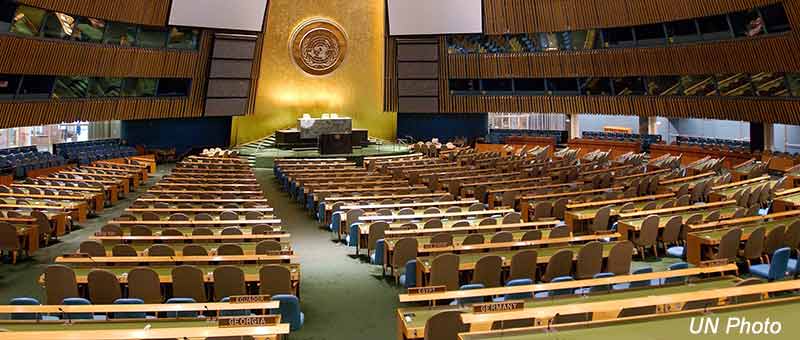- World
- Dec 13
Explainer - UN General Assembly emergency special session
• India has voted in favour of a draft resolution in the UN General Assembly that demanded an immediate humanitarian ceasefire in the Israel-Hamas conflict and unconditional release of all hostages.
• The 193-member UN General Assembly overwhelmingly adopted the resolution at the resumed 10th emergency special session on December 12.
• The resolution, introduced by Egypt, demanded an immediate humanitarian ceasefire and reiterated its demand that all parties comply with their obligations under international law, including international humanitarian law, notably about the protection of civilians.
• It also demanded the immediate and unconditional release of all hostages, as well as ensuring humanitarian access.
• India was among the 153 nations that voted in favour of the resolution, adopted amid a round of applause.
Resolutions not legally binding
• Resolutions by the General Assembly, though not legally binding on nations, do carry immense moral weight, representing the collective resolve of the UN membership on a matter of grave importance.
• These resolutions also lead to key legal frameworks and standards, such as the over 60 human rights instruments underpinning the international rights regime, which emanate from the Universal Declaration of Human Rights.
• The Declaration was proclaimed by the General Assembly in 1948, and by itself is not binding.
Emergency Special Session
• Under the resolution 377A(V), widely known as ‘Uniting for Peace’, adopted by the General Assembly on November 3, 1950, an emergency special session can be convened within 24 hours.
• When the UN Security Council is unable to shoulder its primary responsibility to maintain international peace and security, the General Assembly can consider the matter immediately in an emergency special session and recommend to its members collective measures to maintain or restore international peace and security as stipulated in the Assembly’s ‘Uniting for Peace’ resolution.
• UN Member States can request the Assembly President to convene such a session, with a view to making appropriate recommendations for collective measures, including calling for ceasefires, and in the case of a breach of the peace or act of aggression, as a last resort, the use of armed force when necessary.
• An emergency special session swiftly happens when the UN Security Council is deadlocked. That occurs when one of the five permanent Council members (China, France, Russia, United Kingdom, United States) uses their UN Charter-mandated veto power to quash a related draft resolution.
• While veto use can also be quickly scrutinised at a regular General Assembly meeting, emergency special sessions are one option the UN membership has to debate urgent peace and security matters.
• The establishment and guiding rules of these sessions came after the outbreak of the Korean Peninsula conflict in 1950, when the Assembly adopted its landmark ‘Uniting for Peace’ resolution.
• Another unique element is that unlike the 15-member Security Council, a veto cannot be used in the 193-member General Assembly. If a two-thirds majority of the Assembly votes in favour, a proposed draft resolution is adopted.
• Only 11 emergency special sessions have been called in the last 73 years.
• The eleventh was convened, following a Security Council veto, six days after Russia’s full-scale invasion of Ukraine in 2022, resulting in a broadly supported resolution on the crisis.
• Six of the 11 Assembly emergency special sessions relate to the Middle East.
• The first ever such session was held in 1956 to consider the 1949 Arab-Israeli armistice agreements, which had been “disregarded” amid foreign military presence on Egypt’s territory near the Suez Canal.
• During that session, the Assembly adopted a package of resolutions that, among other things, requested, “as a matter of priority, the Secretary-General to submit to it within 48 hours a plan for the setting up, with the consent of the nations concerned, of an emergency international United Nations Force to secure and supervise the cessation of hostilities”.
• Other emergency special sessions were convened on matters in the Middle East in 1958 and 1967, the question of Palestine in 1980, and the situation in the occupied Arab territories in 1982.
• The 10th emergency special session pertains to the matter of illegal Israeli actions in Occupied East Jerusalem and the rest of the Occupied Palestinian Territory. The 10th emergency special session was convened for the first time in April 1997, following a request from Qatar.
• The 10th emergency special session was resumed in October 2023.
Manorama Yearbook app is now available on Google Play Store and iOS App Store


